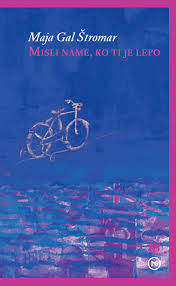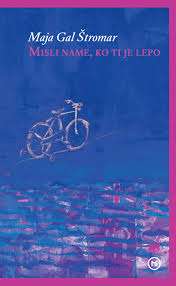Synopsis

Before you is a short, personally narrated tale by the contemporary Slovene writer and actress Maja Gal Štromar. The novel Think of Me in the Good Times was published in the original Slovene in 2011 by Mladinska Knjiga, the largest publishing house in Slovenia and received exceptional reviews. It has been translated into in Croatian and Italian.
This short novel is the kind of rich and profound writing that delivers invincible twists and insights throughout the storyline. In terms of genre, it could be placed within the so called I-Novel (Shishōsetsu), highly regarded in Japan, where the events in the story correspond to events in the author’s life, in this case the death of her father.
The overall narrative of the novel is anchored at a time shortly after her father’s death, but is constantly interrupted by flashbacks and existential ponderings, blinded at first through the distorted viewpoint of a hurt child, later seen from the point of a growing up woman and finally a mature observant person on which the foreordination and transience of our earthly existence can only confer (self)acceptance. We are witness to a prolonged farewell in the form of intimate questioning, but also what is probably the first encounter and recognition of acceptance between father and daughter, albeit posthumously. Without doubt this is an intimate and at the same time so humanly universal maturity test of alterations between birth and death.
The novel Think of Me in the Good Times is unpretentious, deep, touching, dramatic and honest writing that includes a number of essential black humour twists. A universal topic since, as the author herself says, we all have fathers, regardless of borders, languages and ethnicity.
Selected reviews
‘Maja Gal Štromar has written a book well worth reading. In doing so we shall be reading the book of our own life. What a gift and what grace!’
Manca Košir, renowned media personality in Slovenia
‘It is not an achievement these days to write personally and openly. To remain in the field of good literature, without sliding into exhibitionism, however, is rare.’
Miha Mazzini, writer and film director
‘Maja Gal Štromar’s writing is a story of beauty and essence emanating from her literary heroes. Her artistic narration is also a spiritual elaboration and never a mere explicit or banal echo of reality. As such the images and colours reflected in Maja Gal Štromar’s literary consciousness become a gift that she continually renews, remodels and re-analyses, elaborating them into a reality she is able to embody.’
Dr. Tatjana Rojc, literary critic, professor at the Universities of Udine, Trieste, La Sapienza Rome
‘Although a story about death, this novel is much more than an ode to life. Day after day, again and again, we observe the heritage of our parents, often seeing it in black and white, either as only good or only bad. It is, however, only when we lose one of our parents that we realise how everything is as it was meant to be. Upon seeing their grey faces, never again to look over us on this Earth, there is only one thing left to them – thank you. Maja Gal Štromar’s work is an honest narrative of another universal personal story, one of those we come across rarely, yet should pay more attention to. It makes us realise that it is our ordinary and human thoughts and emotions that make us unique.’
Nika Vistoropski, journalist at »ONA« Slovene women’s weekly
‘What strength is needed for such sincere intimacy that can only compete with the superiority of Maja’s language, pure down to its ultimate translucent depths? What sensitivity and what courage are necessary for such intellectual maturing into the extreme emotional states that turn a girl into a woman? Inconceivably more than are invested into the behaviour and dreams of a man. Maja subtly transposes into our consciousness and conscience all her knowledge on basic existential questions that demonstrate themselves on a daily basis through our view and words, making us happy and sad. By the final page one becomes more wholly aware of what we do simply because we exist. Any intuitively perceptive man reading Maja Gal Štromar’s novel Think of Me in the Good Times will become better fathers and a better husbands. As for becoming better lovers, Maja leaves, through a series of repetitions, passion and love to take their own course.’
Tomaž Letnar, novelist and screenwriter
‘Think of Me in The Good Times is not only an interesting psychological study or an attempt to settle one’s scores with oneself. It contains many literary qualities, from a well conceived, synthetically analytical structure to a rich, lively language and finely crafted style. The way the author expresses herself alone, (i.e. the precise, witty and contemporary choice of words) guarantees that reading it becomes a valuable experience.’
Magda Jevnikar, Radio Trieste A, RAI Italia
“Think of Me in the Good Times is principally a story about the Goddess, the Woman, an ordinary, typical woman who, upon having to face Hades’ numerous inexorable attributes, sets off on a path to find herself. All women know how hard yet wonderful it is to be a woman – a complete woman. Maja expresses it beautifully.”
Vesna Kragelj, astropsychologist
‘Through her father’s death, Maja Gal Štromar returns to the pre-image, distinct and separate, that she succeeds on an intuitive level (mentally, emotionally, sensually, spiritually) through death to animate into a pulse, into an expressive ‘yes’ to life, into the completeness of her own image that becomes ‘fertile like the sunny valley of gratitude.’ With her last sentence ‘Thank you, Father’ the narration ends in an emanation of love, in a full pulse of existence. Or, as the psychologist Petar Jevremović says, “…ultimately every human joy, goodness and beauty is measured at death. In the world of mortal beings, only what defies death has highest value status.”’
Ines Cergol, Novi Glas, writer and literary critic, Gorizia, Italy
‘Think of Me in the Good Times cannot only be reduced to its interesting topic, what I like are the elegant descriptions of dreams and the fine fusion between the layers and motifs in the narration. The writing as such is, especially linguistically, so refined that I will allow myself to paraphrase Wittgenstein in saying, ‘Literature is a consequence of seeking out the possibilities in how to express love and hatred.’
Aljaž Kovač, »Književni listi«, Delo, Slovenia’s key literary review
‘The author persistently moves in the direction of her chosen point, the book this building on concentration, with certain passages reaching virtual perfection. An almost eerie closeness of the documentary and the literary.’
Gabrijela Babnik, »Književni listi«, Delo, Slovenia’s key literary review
‘With, as it seems, fathers these days becoming an endangered species, the writer, poet, translator and actress Maja Gal Štromar has written a strong homage hers.
Tina Vrščaj, Slovene literary magazine »Pogledi«
‘Carefully thought out insights into events through various angles engage the reader into a committed read, especially as the book is written in a skilfully polished language and highly defined style. In writing that would otherwise appear as little more than an elaborated psychological study, this is particularly precious.”
Cvetka Bevc, writer, Slovene National Radio
